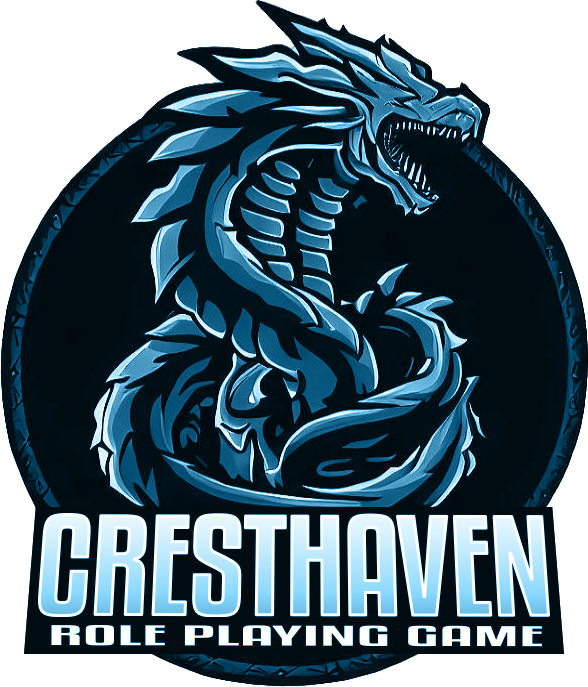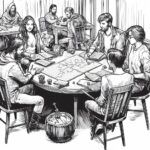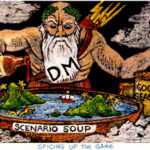In Cresthaven RPG, checks are how you determine the outcome of uncertain actions. When your character tries to do something and the result isn’t guaranteed, you’ll make a check.
How To Use The Dice
When playing Cresthaven RPG, checks are used in a very specific way for non-combat actions. It’s about you telling the DM what you’re trying to do, and then describing how your character attempts it.
How do you figure out what happens?
- Tell the DM what you are trying to do. Clearly state your character’s goal. Examples: “I’m trying to climb this wall,” “I want to pick the lock on this chest,” or “I’m going to try and deceive the guards.” Focus on what you want to achieve.
- Note: You should never ask IF you can do something. Just state what your character is trying to do, and the DM will guide you on the process.
- Narrate how this is to be accomplished. Describe in detail how your character attempts the action. This is the core of role-playing!
- Examples: “I use my grappling hook to get a purchase on the wall and try to climb,” or “Using my thief’s tools, I carefully probe the tumblers to pick the lock,” or “I pull the guard aside and spin a tall tale about an emergency to distract him.”
- Think about your character’s strengths. Could your strong Fighter try to smash the lock instead of picking it? The DM will then determine if a check is needed and what type.
Basic Check Mechanics
Making a Check
To make a check, you roll a d20 and add relevant modifiers. If your total equals or exceeds the Difficulty Class (DC) set by the DM, you succeed.
Basic Formula: d20 + Ability Modifier + Skill Bonus + Other Modifiers ≥ DC = Success
- Roll a d20: This is your base roll.
- Add your Ability Modifier: This comes from the ability score (Strength, Dexterity, Wisdom, etc.) the DM tells you to use for the task.
- Add Skill Bonuses: If you have training in a relevant skill (like Climb, Search, or Deception), add your character’s bonus for that skill.
- Add Other Modifiers: This can include bonuses or penalties from equipment, magic, or unique situations.
Special Mechanics
Rolling Advantage / Disadvantage
Sometimes, circumstances or abilities will give you advantage or disadvantage on a d20 roll (including skill checks, ability saves, or attack rolls).
- Advantage: Roll two d20s and take the higher result.
- Disadvantage: Roll two d20s and take the lower result.
If you have both advantage and disadvantage from different sources, they cancel each other out, and you roll a single d20 normally.
Natural 20 Rule
A roll of 20 on the d20 (before adding any modifiers) is always an automatic success, regardless of the DC.
Ability Focus
If you have Ability Focus in the ability score the DM asks you to use for the check, you add your character level divided by 2 (rounded up) as an additional bonus.
Teamwork Bonus
When your entire party works together on a single task (e.g., searching a room), the DM might have you make one collective check. In this case, you use the highest relevant ability modifier among the group and roll with advantage.
Heroic Points
Each session you play, your character earns 1 Heroic Point. These points are tracked on your character sheet (or with physical tokens like RPG coins or glass beads) and accumulate.
You can spend Heroic Points to gain powerful benefits:
- Re-roll a dice roll: Spend 1 Heroic Point to re-roll any d20 roll (skill check, ability save, or attack roll). You must keep the new result, even if it’s worse.
- Add advantage: Spend 1 Heroic Point to gain advantage on any d20 roll.
Deal with the DM
Once per game, at the DMs’ discretion, a player may choose to make a Deal with the DM where in the player changes one d20 roll to a natural 20, but the DM then can change any other roll of the player’s to a natural 1.
Common Check Types
Here are some common types of checks you might be asked to make:
- Climbing:Dexterity (Climb) Check. Used when scaling walls, trees, or other vertical surfaces.
- DC 10: Rough stone wall with handholds
- DC 15: Smooth stone wall
- DC 20: Sheer cliff face
- Searching:Wisdom (Search) Check. Used when actively looking for hidden objects, secret doors, or traps.
- DC 10: Finding something poorly hidden
- DC 15: Locating secret doors or traps
- DC 20: Discovering well-concealed items
- Listening:Wisdom (Listen) Check. Used to detect sounds, quiet conversations, or approaching creatures.
- DC 10: Loud conversation through a door
- DC 15: Quiet footsteps in the next room
- DC 20: Whispered conversation
Ability Saves
Ability saves are special checks you make to resist harmful effects like spells, poisons, or dangerous environmental factors.
How to Make an Ability Save
Roll a d20, add the relevant ability modifier, and meet or exceed the DC set by the DM to succeed.
Common Ability Save Types
- Poison (ingested/injected): Constitution Check
- Magic/Spells: Intelligence Check
- Death (when reduced to 0 HP): Constitution Check
- Paralysis/Petrification: Strength Check
- Breath Weapons/Gas: Wisdom Check
Examples in Play
Example 1: Climbing with Skill
- Situation: Your Thief is attempting to climb a steep rock wall (DM sets DC 15).
- Your Character’s Relevant Stats:
- Dexterity: +3
- Trained in Climb skill: +5 (This includes any base bonus for Climb)
- Ability Focus (Dexterity): +2 (at character level 3)
- Your Roll: d20 (you roll a 12) + 3 (Dex) + 5 (Climb) + 2 (Ability Focus) = 22
- Result: You succeed! (22 is greater than DC 15). Your Thief scales the wall easily and can now assist others.
Example 2: Climbing without Skill
- Situation: Your Fighter is attempting the same climb (DC 15), but wants to brute force it.
- Your Character’s Relevant Stats:
- Strength: +4 (used for brute force, but no Climb skill bonus applies)
- Your Roll: d20 (you roll an 11) + 4 (Str) = 15
- Result: You succeed! (15 equals DC 15). Your Fighter just barely succeeds by powering through with raw strength.
Example 3: Team Search
- Situation: Your party is searching a dusty room for secret doors (DM sets DC 15). You decide to use the teamwork bonus.
- Party’s Relevant Stats:
- Highest Wisdom in party: +3 (This includes a character’s Wisdom modifier + the base +1 for the Search skill)
- Your Roll (with advantage): You roll two d20s (e.g., an 8 and a 16), and take the higher (16).
- Total: 16 + 3 = 19 vs. DC 15
- Result: Success! Your party’s combined effort reveals the hidden passage.






